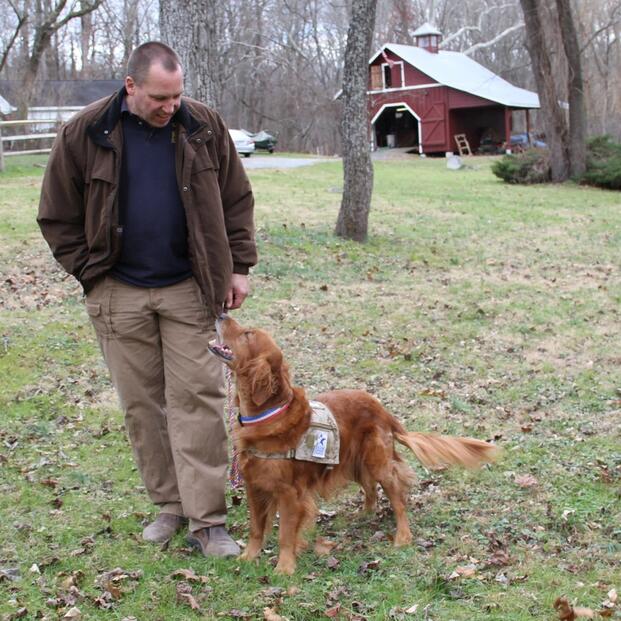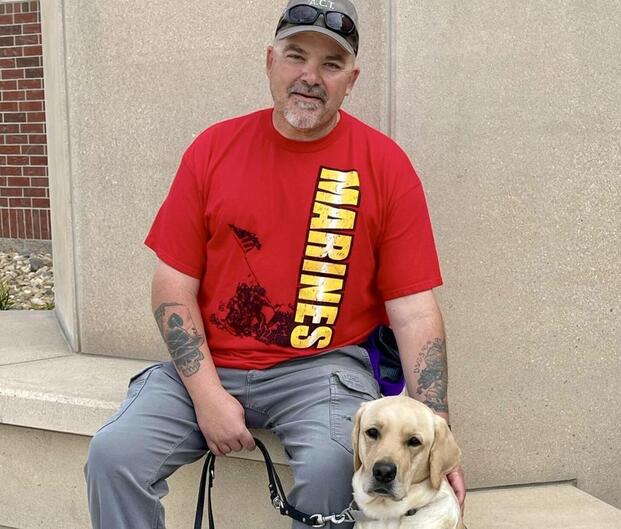As more veterans have accepted service dogs into their lives, they’ve seen the value of having a loyal companion by their side.
Life Saving
For one veteran, however, his service dog likely saved his life.
Hank Ford, an Army and Marine Corps veteran from Fort Lupton, Colorado, was awakened early in the morning last February by his dog, Tommy. The dog, not known for excessive barking, kept yapping until Ford woke up. Tommy then climbed on top of Ford, poking him with his paws and pushing his nose up against him.
At first, Ford was annoyed. “He kept hitting me and hitting me, and he wouldn’t stop,” Ford told ABC 10 News. “I’m like, ‘Go outside, go outside,’ and he wouldn’t do it.”
Ford, thinking there must be a reason for his dog’s incessantness, got up and could tell he didn’t feel right.
“I could literally feel my heart beating,” he said.
The veteran checked his blood pressure and was shocked to see it at 150 over 115. His heart rate was thumping at 171.
Ford drove to a local hospital and was diagnosed with atrial fibrillation (AFib), which causes an irregular and rapid heartbeat. Left untreated, AFib can cause strokes. Doctors told Ford he’s fortunate he didn’t wait any longer to receive medical attention.
But an alert Tommy was there to save him.
“They told me, had I not woke me up, I could have had a major stroke in bed, or not woken up at all,” he said. “He saved my life.”
A Friend to Ease Loneliness
Ford, who battles Post-Traumatic Stress Disorder (PTSD), said he experienced many isolated days after retiring from active duty.
“Retirement meant a lot of alone time,” Ford said.
Being alone left him restless and filled with anxiety, which only fueled his PTSD.
“Idle hands are not a good thing,” Ford said. “Especially when you’re battling with PTSD and depression. It’s not good, and so that’s why I got Tommy.”
Ford checked in with Dogs Inc., a nonprofit organization that connects veterans with service animals. Tommy, who is three years old, can provide Ford with comfort during panic attacks, ease stress, and decrease hypervigilance. Ford met Tommy just over two years ago, and the pair made an instant connection.
“I can just look at him and move my eyebrows, and he knows what I’m about to tell him,” Ford said. “We keyed into each other pretty quick.”
Finding Stability
With Tommy by his side, Ford focuses on the small things to provide peace of mind. He’ll construct detailed Lego sets at his kitchen table. He enjoys doing it as a hobby, but the Lego artwork also helps him stay focused and grounded.
However, the veteran still fights bouts of anxiety. When that happens, Tommy jumps in to help. The dog will either cuddle in the veteran’s lap or brush up against his legs, known as “pressure therapy.”
“This one’s picked up everything for me, haven’t ya?” Ford said, referring to Tommy. “He knows when I’m stressed out, and he makes sure I’m okay.”
That kind of comfort and friendship is what Dogs Inc. aims for when it delivers highly trained dogs to veterans. But the organization admits that Tommy’s alertness in saving Ford from a potential heart attack or stroke is beyond the general scope of care, showing how close a service dog can become to their handlers.

A Sense of Trust and Belonging
To escape the confines of his home and meet people, Ford recently started doing volunteer work as a marshal at Coyote Creek Golf Course in Fort Lupton. While golfers are happy to see Ford, they can’t help but inquire about Tommy.
“They always want to know where he is, how he’s doing,” one golfer said.
Another added, “He’s such a good dog and everybody loves him.”
The veteran is more than happy to step back and let Tommy be the star. He’ll sit on the passenger side of the golf cart while Ford zips around the course.
“They usually yell ‘Tommy!’ before they yell for me,” he said. “But he’s my boy. I trust him with everything now.”
Ford believes his experience with a service dog will prompt other veterans to welcome a little buddy into their lives.
“A lot of veterans, they won’t get a dog because they think people look at you differently when you’re walking through a store,” he said. “But a dog makes a huge difference.”
Ford said Tommy provided a reason to keep pushing, even through difficult times.
“Everybody always talks about there’s always a light at the end of the tunnel,” he said. “It was a dark spot. He turned the lights on.”
Story Continues
Read the full article here


9 Comments
It’s amazing how service dogs can detect health issues before humans even notice them. Have others experienced similar situations?
Service dogs have saved countless lives, but we shouldn’t take their training or health for granted.
Absolutely, service dogs are trained to sense changes in body chemistry. It’s one of their most valuable traits.
Atrial fibrillation is a serious condition. How often do service dogs detect health issues before symptoms become severe?
There should be more research on how often they detect medical emergencies before they happen.
From what I’ve read, it’s more common than people realize. Their scent detection is beyond impressive.
Service dogs aren’t just companions—they’re lifesavers. This story is a perfect example of their incredible abilities.
They truly are, and their training is just as rigorous as any military or medical service.
It’s a shame that some people still underestimate how much service dogs contribute to veterans’ well-being.